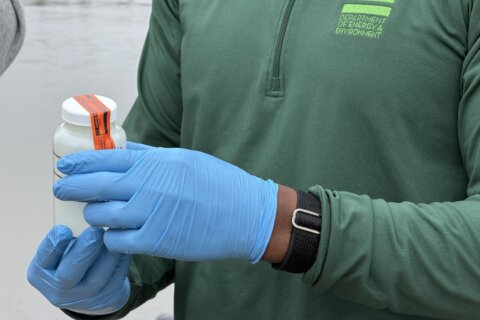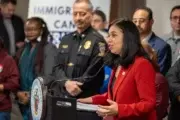The deadly assault on the Capitol by a pro-Trump mob hasn’t only led to an “unprecedented” ramp-up in security ahead of Joe Biden’s inauguration, it also showed the urgent need for D.C. statehood, the District’s newest shadow representative says.
Rep. Oye Owolewa — a Nigerian-American who was on the Advisory Neighborhood Commission for Ward 8 before being elected shadow representative in November — is part of the District’s shadow delegation: two senators and a representative.
Like his colleagues Sens. Paul Strauss and Michael Brown, Owolewa is laser-focused on lobbying for D.C. statehood — while unseated and uncompensated for the work. Owolewa makes his living as a pharmacist.
He told WTOP that statehood is critical so that the city can protect itself and its residents.
Owolewa, who “fortunately” wasn’t at the Capitol the day of the attack, described the factors he saw at play.
“We had a president that put his own interests from the interest of the country,” Owolewa said. “He stoked division within the country, and he’s not allowing us to have a peaceful transfer of power. So, because of that, we’ve seen his supporters storm the Capitol, desecrate the building, endanger elected officials.
“You also saw that our rights as D.C. residents are being trampled on a daily basis. The fact that we don’t have a National Guard, not only to protect ourselves from the next insurrection, but just in general, being able to protect us, further highlights disparities of D.C. residents versus our neighbors in other states.”
Statehood is “not just about an extra star on the flag, but really about the rights of people, voting rights and our ability to make our own laws and control our budget,” Owolewa said, adding that the more informed people are about D.C. statehood, the more the polls will move in its favor.
He’s in good company in the push for D.C. statehood. Mayor Muriel Bowser — recently thrust into the national spotlight for her response to the Capitol riot — has been an ardent, vocal supporter. So has Rep. Steny Hoyer, D-Md.
Rep. Eleanor Holmes Norton, D.C.’s non-voting member, introduced her D.C. statehood bill, H.R. 51, to the 117th Congress with a record-high 202 original co-sponsors earlier in January.
“The sacred right to vote and to have a voice in our government is a core pillar of our freedom. This Congress, Democrats will once again bring Congresswoman Norton’s crucial legislation to the Floor as we fight to secure access to the ballot box for Washingtonians, for historically disenfranchised communities and for all Americans — and we will not stop until that right is a reality for all,” House Speaker Nancy Pelosi said in a statement.
Norton’s bill has enough support to pass in the House, but the Senate could prove to be a significant hurdle. It has been placed on the Senate floor calendar for the first time in history.
Sen. Tom Carper, D-Del., is the lead Senate sponsor for HR 51.
Even if the bill passes both chambers of Congress and heads to Biden’s desk, it could still face legal challenges.
As WTOP’s Mitchell Miller reported, the 23rd Amendment would need to be repealed, and congressional Republicans have indicated they would fight the effort to give D.C. a voting House member, as well as two U.S. Senators, because they would all probably be Democrats.
Republicans have indicated they would challenge the legislation on legal grounds, which could end up before the Supreme Court. That could mean years of legal struggles, though Norton and supporters of the legislation believe it is on firm legal ground.
Owolewa is optimistic about the District’s chances of becoming a state.
“Now that we have a new president coming in, President Joe Biden, who supports D.C. statehood, and we have a vice president who has had experience being in D.C. by being a student at Howard University, we now have the electoral makeup that we need to really achieve D.C. statehood and be able to achieve self governance,” he said.
“I’m excited about my opportunity to be the voice of D.C. to make sure every person in this country knows how D.C. statehood will impact their lives. This is not a local issue,” Owolewa said.
Owolewa said that once D.C. becomes a state, it will add more votes for addressing climate change, more votes for making sure that there is equal law enforcement and more votes toward a fair immigration system.
Owolewa plans to engage the community locally and nationally, and talk to other elected officials about why D.C. statehood is so critical.
He said he already has a goal in mind for what to tackle when the District does become a state.
“Given that I’m a health care provider, I do believe that not only do I represent 700,000 Americans who lack a vote in Congress, but I also represent health care providers who don’t have a say in health care policy,” Owolewa said.
“The first thing I would do is fight for universal health care. We’re talking about a public health care plan, or even Medicare for all, because right now, we are paying a lot of money for our health care, but we’re not having the best health care outcomes,” he said.
He wants to galvanize the health care community, “and make sure that our voice is heard.”
WTOP’s Mitchell Miller contributed to this report.








